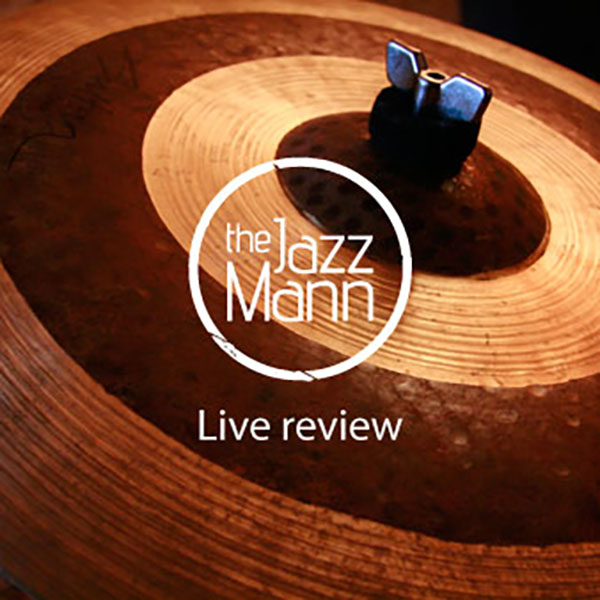
by Ian Mann
October 05, 2008
/ LIVE
Technically impressive but lacking variety and emotional depth
Guitarist (and occasional violinist) Allan Holdsworth first came to prominence in the 1970’s straddling the territory between jazz and progressive rock. A stint with “Bundles” era Soft Machine brought him to wider attention although my favourite context for his playing was with the excellent Bruford band of the late seventies alongside drummer Bill, keyboardist Dave Stewart and bassist Jeff Berlin.
I remember purchasing (on vinyl) a solo album entitled “Velvet Darkness” released on the CTI label in 1976. Holdsworth pretty much decries that particular album now but it did give him experience of working with US musicians (including one long term associate, the keyboard player Alan Pasqua) and Holdsworth, who had also worked in an edition of Tony Williams’ Lifetime, subsequently emigrated to the States in the 80’s. The Bradford born musician was following in the steps of John McLaughlin, also Yorkshire born, and if he has never quite achieved McLaughlin’s status he has worked steadily recording numerous albums and building a loyal following, particularly among serious guitar fans.
Holdsworth’s move abroad saw him pretty much drop off my radar. My last live sighting of him was on a Contemporary Music Network tour in 1980 guesting alongside the late Neil Ardley with Jeff Clyne’s Turning Point. Clyne’s group were criminally underrated and with these two distinguished guests in tow the CMN show was a memorable gig.
Now all these years later the Bilston gig presented an opportunity for me to catch up with Holdsworth. His years in the States have seen him polishing his technique, experimenting with guitar synthesisers and other devices and working in various contexts from song based ensembles to power trios but still operating in the hinterland between rock and jazz.
The power trio remains a staple component of Holdsworth’s work and the line up he brought to Bilston promised musical fireworks. Drummer Chad Wackerman is a long term Holdsworth associate and a former Frank Zappa side man. Replacing the advertised Jimmy Johnson on electric bass was LA musician Ernest Tibbs who has had previous experience of working with Holdsworth.
Playing at rock volume the trio kicked off with Wackerman’s tune “The Fifth”. As if to demonstrate the democracy within the band the first solo went to Tibbs on six string bass. Although the bass sound was a little muddy at first this was soon cleared up and Tibbs delivered a wonderfully fluent solo, enjoying the chance to show his chops. Holdsworth followed suit showing all the choked intensity of old. He has developed a unique tone/sound on the instrument despite, or maybe because of, the various electronic embellishments that colour his playing and he clearly has technique to burn.
The second tune (the title escaped me but this proved to be of little consequence) mined a similar vein before “Water On The Brain” from Holdsworth’s “Road Days” album allowed Wackerman and Tibbs the chance to stretch out.
What we had seen so far was technically impressive but for me rather lacking in soul or feel. Part of the problem is that Wackerman, for all his technical skills is primarily a rock drummer who plays pretty much at one volume setting-loud. As a result there was precious little light and shade in Holdsworth’s music, no real effort to tell a story or vary the dynamics in the course of a tune.
The next piece however partially undermined this statement as Wackerman and Tibbs dropped out mid tune to allow Holdsworth to conjure the eerie sounds of deep space from his instrument in a haunting and evocative manner. When the rhythm section kicked in again Holdsworth’s now searing guitar was contrasted with the earlier quietness and was all the more effective for it.
Holdsworth had given up announcing the titles by now, hopefully because he just wanted to play rather than because he was bored. The next two tunes both featured solos by the impressive Tibbs and by Wackerman. This most appropriately named of drummers powered his way through two muscular, powerful, pyrotechnic, polyrhythmic hammerings. It was dazzling stuff but surely two drum solos of this length in successive numbers in a single set was rather over egging the pudding.
However it was enough for a small coterie of devotees to call the band back for an encore. This was propulsively funky and tuneful and much more accessible than much of what had gone before. The funk gradually mutated into something approaching heavy metal in this musical tour de force. Along with the spacey fourth number this was the stand out item of the evening.
The Holdsworth band had fizzled fitfully, occasionally exploding into life with something genuinely remarkable. However there were times when I felt that they were merely going through the motions and that the music was more concerned with technique rather than revealing any kind of emotional depth. There was not even a semblance of a ballad and no real attempt to pace the show in the manner of say, Pat Metheny.
Ultimately Holdsworth left me rather cold. In the main part this was music to admire rather than to enjoy or become emotionally engaged with. The sparseness of the crowd didn’t help, a combination of several factors I suspect ranging from the credit crunch to Wolves playing at home the same night (they lost 3-0 to Reading if anybody’s interested-their first defeat of the season). A gig in nearby Worcester two days later may also have served to split the Midlands fan base.
This was a shame as the Robin is an excellent venue and capable of generating a great atmosphere when there’s a large crowd in.
blog comments powered by Disqus